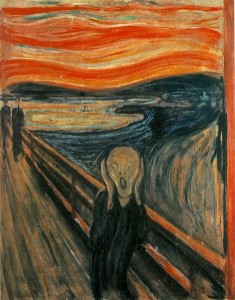If you’re like us, you like being scared this time of year, whether it’s from hearing spooky stories, watching the creepiest movies ever, or visiting “haunted” houses. However you like to get your jim-jams, there are many different ways to express your fear.
You might say you have the willies, “a feeling of nervousness or fear.” According to the Online Etymology Dictionary, willies may come from woollies, “a dialectal term for ‘nervous uneasiness,’ probably in reference to the itchiness of wool garments.” Or you might have the heebie-jeebies, which was coined by “William De Beck (1890-1942), American cartoonist, in his comic strip Barney Google.” Then again, you could have the creeps, the all-overs, or the collywobbles, which also refers to a stomachache. Collywobbles is attested to 1823 and is a “fanciful formation from colic and wobble.”
Or maybe your fears are of the screaming variety, whether abdabs or meemies. The origin of the term screaming abdabs is obscure. World Wide Words suggests, by way of slang-master Jonathon Green, that “the word could imitate the stuttering noise that somebody might produce when in a state of funk or incoherent frustration.” It could also be related to the term abba-dabba, which refers to “persons of such limited capacities that they are unable to properly form words.” Another origin may be “an old ragtime song called Abba Dabba Honeymoon.”
The origin of screaming meemies is a bit clearer. The Online Etymology Dictionary says it’s “World War I army slang, originally a soldiers’ name for a type of German artillery shell that made a loud noise in flight (from French woman’s name Mimi), extended to the battle fatigue caused by long exposure to enemy fire.” And in case you were wondering, the word scream may be related to the Old Norse skræma, “to terrify, scare.”
Scary stuff may give you gooseflesh, “a rough condition of the skin, resembling that of a plucked goose, caused by the contraction of the erector muscles of the superficial hairs (arrectores pilorum), and induced by cold, fear, and other exciting causes,” also know as goose pimples, goose bumps, and more formally, horripilation.
Horripilation comes from the Latin horripilāre, “to bristle with hairs.” Horripilāre is made up of horrēre, “to tremble,” plus pilāre, “to grow hair,” which comes from pilus, “hair.” Horrēre also gives as horror, which once also meant “a bristling or ruffling, as of the surface of water; a rippling,” and “a shivering or shuddering, as in the cold fit which precedes a fever,” in addition to its more common meaning, “a painful emotion of fear or abhorrence; a shuddering with terror or loathing; the feeling inspired by something frightful or shocking.”
Have nightmares? Then you’re hag-ridden, also an old term for sleep paralysis, with “the sensation of being held immobile in bed, often by a heavy weight, and accompanied by a sense of alien presence.” This is based on folklore that while you’re sleeping, you may be visited by a night-hag that will sit on your chest and immobilize you. The succubus is “a lascivious spirit supposed to have sexual intercourse with the men by night.” The incubus is the male version of the succubus, and also means “nightmare” and figuratively, “a heavy or oppressive burden; especially, a heavy weight on the mind.” While succubus comes from the Latin succubāre, “to lie under,” incubus comes from the Latin incubāre, “to lie down on.”
Ephialtes, a Greek god sometimes considered the “daimon of nightmares,” may come from the Greek ephallesthai, “to leap upon.” The mara is “a female demon who torments people in sleep by crouching on their chests or stomachs, or by causing terrifying visions,” and is related to the mare of nightmare. Nightmare originally meant “”an evil female spirit afflicting sleepers with a feeling of suffocation.” Mare comes from the Old English mare, “incubus.”
Still haven’t had enough? Check out this creepy crawly list, this scary one, and this one about sleeping – or not sleeping. The Virtual Linguist explains the origins behind the word Halloween and its traditions; Lynneguist discusses the American and British differences between some autumnal holidays; and Fritinancy rounds up some spooky foods and drinks. Finally, in case you missed any of our other Halloween posts, here they are.
From everyone at Wordnik, BOO!

Great article! I’d covered a few of these expressions on my blog funwithenglighblog.com. I’ll have to add a link to this in today’s post!
What!? No *howling fantods*? Shame.